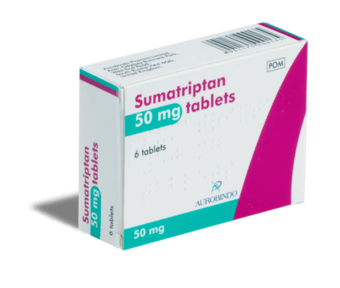Medication features
Sumatriptan is a migraine medication, used to alleviate associated symptoms of headaches, nausea and light sensitivity. Take Sumatriptan migraine medication as soon as your migraine occurs in order to effectively tackle symptoms.
This pain-relieving medication works by thinning the brain’s blood vessels and blocking pain receptors associated with migraine headaches.
- Effective migraine pain relief treatment
- 50mg & 100mg tablets available
- Generic version of Imigran
- Free online consultation available
- Next day delivery
Sumatriptan Tablets (50mg & 100mg) Summary
| Type of Medicine | Seratonin Receptor Agonists (Triptan) |
|---|---|
| Works by | It causes the blood vessels in the brain to narrow helping to reduce headache migraine symptoms. |
| Active ingredient | Sumatriptan succinate |
| Effective within | 30 - 60 minutes |
| Pack size | 6 Tablets |
| Strength | 50mg, 100mg |
| Generic | Yes |
| Use with alcohol | Check with your GP or pharmacist |
| Price | From £5.89 |
Overview
What is Sumatriptan and how does it work?
Sumatriptan, available in 50mg and 100mg tablets, effectively relieves migraines in adults. Part of the triptans or serotonin agonists group, it is specifically used when standard pain relievers like aspirin or acetaminophen are inadequate. Ideal for use at the onset of migraine symptoms, Sumatriptan can also provide relief if taken after the headache starts, though the effect may be delayed.
Sumatriptan narrows the brain’s blood vessels providing relief from the swelling. It reduces the triggers which cause headaches, noise and light sensitivity, nausea, and vomiting brought on by migraines. It is helpful in treating moderate to severe headaches.
Sumatriptan is recommended for occasional migraines and should not be used frequently. For persistent headaches, further medical evaluation is advised. Sumatriptan is a targeted choice for moderate to severe migraine relief, well-established in its efficacy within the 'triptan' class of drugs.
To learn more about migraines, look at our guide that answers the question ‘what is a migraine?’.
Sumatriptan migraine prescription medication alternatives
Whilst Sumatriptan tablets are a proven choice for migraine relief, it's beneficial to consider other medications, especially for individuals with unique health needs or preferences.
During your online consultation with a Cloud Pharmacy pharmacist, the following alternatives may be suggested:
- Zomig Tablets 2.5mg: Containing Zolmitriptan as its active component, this medication effectively treats migraines, whether they are preceded by an aura or not
- Zolmitriptan Tablets: These tablets are effective in treating acute migraine headaches, although they do not prevent future episodes
- Rizatriptan Tablets: Useful for alleviating migraines and their accompanying symptoms, such as nausea, pain, and visual disturbances. For more information, take a look at our guide that compares Rizatriptan and Sumatriptan
- Almotriptan Tablets: These tablets aid in reducing migraine-related headaches, light sensitivity, and nausea by narrowing the blood vessels in the brain.
- Vydura (Rimegepant) Tablets: This a new class of migraine treatment known as "gepants" and can be useful in acute attacks or migraine prevention.
Sumatriptan Over The Counter Alternatives
Below we’ve compiled a list of over-the-counter (OTC) alternatives to Sumatriptan tablets. Please consult a healthcare professional if you are considering taking any of these with Sumatriptan 50mg & 100mg tablets.
- Paracetamol: Common for various pains, including headaches. For migraines, take two tablets every four hours, not exceeding four doses in 24 hours
- Ibuprofen: Effective for mild to moderate pain, including migraines. Can be combined with paracetamol for better symptom management
- Anadin Extra: Combination of aspirin, paracetamol, and caffeine. Take two tablets up to four times a day, with a 24-hour limit of eight tablets
- Solpadeine Plus: Contains paracetamol, codeine, and caffeine. Suitable for those who have difficulty swallowing pills. Limit use to three consecutive days due to addiction risk
- Migraleve: Specialized for migraines, with paracetamol, codeine, and buclizine. Use Migraleve Pink at migraine onset and Migraleve Yellow four hours later if needed. Maximum eight tablets in 24 hours and three consecutive days of use
Informational sources
If you’d like to find out more about Sumatriptan tablets or migraines in general, we’ve compiled a list of additional resources below for you to take a look at:
- Sumatriptan Reviews: What Our Customers Think
- What Is Sumatriptan: Benefits, Uses, Side Effects
- NHS - Common questions about Sumatriptan
- PubMed - Efficacy and safety of Sumatriptan tablets
- PubMed - Long-term experience with Sumatriptan
- The Migraine Trust - Impact of Migraines
- Sumatriptan Patient Information Leaflet (PIL)
Side Effects
Sumatriptan side effects
Sumatriptan has some common and less common side effects. Most people experience no side effects or minor issues.
Common side effects of Sumatriptan
- Nausea or vomiting
- Dizziness
- Flushing or unusual hot and cold symptoms
These can also be associated with migraines and cluster headaches, so you might not even notice them as side effects. However, consult your doctor or pharmacist if they are severe or last longer than a few days.
Provided these side effects aren’t severe, it is usually safe to wait a few days and see if they subside. If you are concerned, speak to your doctor.
Serious side effects of Sumatriptan
Serious side effects are rare. However, if you experience the following, seek medical attention immediately:
- Tingling or tightness in your chest
- Tingling or tightness elsewhere on your body, including your arms, legs, or face
- Heaviness in your body
- Warmth or cold in your face
If any of these symptoms feel very intense, seek emergency medical care.
Rarely do people experience a severe allergic reaction to this medication. However, it’s important to know what to look out for. Severe allergic reaction symptoms include:
- Wheezing or spluttering
- Trouble breathing or talking
- Swelling in the tongue, face, throat, and lips
- Severe tightness in the chest or throat
If you experience this, go to A&E immediately or call 999.
If you have the following conditions, you should not take Sumatriptan tablets:
- Angina or artery disease
- A history of stroke
- High blood pressure (if you have had high blood pressure in the past and now stabilised, Sumatriptan tablets may be suitable)
- Peripheral vascular disease
- Hemiplegic or basilar migraine
- Severe hepatic impairment
- Ischemic bowel disease
Warnings
Sumatriptan warnings
Inform your doctor in case you have:
- hypertension;
- coronary heart disease;
- arrhythmia;
- high cholesterol;
- a history of kidney or liver disease;
- a family history of coronary artery disease; and
- if you are male at least 40 years of age or a woman who has had a hysterectomy.
Additionally, inform your doctor of all the medications you are currently taking especially antidepressants, both prescription and over-the-counter, as these could interact with Sumatriptan.
Sumatriptan should not be used during pregnancy. It should be prescribed only when clearly needed. Discuss with your doctor the benefits and risk of taking this medication during your pregnancy.
Sumatriptan passes into breast milk in small amounts. Consult your doctor before you breastfeed.
A drug interaction may alter the way your medicine works or increase the risks of side effects. Share with your doctor a list of all the medications you are currently taking. Do not start, stop, or change the dosage of any medicine without first getting the approval of your doctor.
Do not take any MAO inhibitors during treatment with sumatriptan as the combination may cause serious, possibly fatal, drug interactions.
Sumatriptan drug interactions
Speak to your doctor before taking Sumatriptan if you also take any other medication. This includes prescribed drugs, over-the-counter medications, and herbal medicine.
Most medication is safe to take with Sumatriptan, but the advice changes occasionally, and your doctor will have the most up-to-date guidance.
You should take particular concern if you already take the following medication:
- Other triptans, ergotamine, or other migraine and headache medicine
- Certain antidepressants
- Opioids, including codeine, fentanyl, or morphine
- Bromocriptine
- Tramadol
Antidepressants, including herbal medication like St John’s wort, taken with Sumatriptan could put you at risk of serotonin syndrome. The symptoms of serotonin syndrome include twitching, high temperature, diarrhoea, shivering, increased heart rate, or unusual mood changes. If you experience these, seek immediate medical care.
This list does not include every possible drug reaction, so it is important to consult with your doctor before taking Sumatriptan tablets if you use any other medication.
Patient Information Leaflet
Before taking any medication, it is important to read the Patient Information Leaflet.
These can be found on medicines.org by typing them into the search bar.
Directions
Sumatriptan dosage & directions of use
Taking Sumatriptan 50mg & 100mg Tablets:
- Swallow tablets whole with water. If you struggle to swallow pills, check with your doctor or pharmacist if it’s ok to break tablets in half to make swallowing easier
- Sumatriptan 50mg is generally sufficient for most migraines. For severe cases, or if 50mg is ineffective, your doctor may prescribe 100mg
- If one tablet doesn't alleviate the migraine, you may take another but do not exceed 300mg in 24 hours
Use Sumatriptan only for migraine relief. Do not take with additional ‘triptans’
Ingredients
Sumatriptan Ingredients
Ingredients that make up Sumatriptan tablets include:
- Active Component: Sumatriptan succinate
Additional Ingredients include:
- Lactose monohydrate
- Hypromellose
- Microcrystalline cellulose
- Crosscarmellose sodium
- Magnesium stearate
- Titanium dioxide (E171)
- Triacetin
- Red iron oxide (E172)
Always check with a healthcare professional before taking Sumatriptan to ensure you are not allergic to any ingredients.
Sumatriptan Tablets (50mg & 100mg) FAQs
How long does Sumatriptan take to work?
You should take Sumatriptan tablets as soon as you experience a migraine - but not before the migraine actually starts (not while you are in the ‘aura’ phase). Generally, you will notice some relief after 30 to 60 minutes.
How long does Sumatriptan stay in your system?
Sumatriptan is short-acting; people often report that headaches recur a few hours after taking Sumatriptan tablets. If this happens to you, you can take more Sumatriptan but do not exceed the dosage of 300mg of tablets in 24 hours.
What do customers think of Sumatriptan tablets?
Most Sumatriptan reviews are very positive. Reviewers report that Sumatriptan can get rid of migraines efficiently and quickly, targeting headaches that painkillers have not been able to eliminate. A few people mention side effects, but these side effects bear similarities to symptoms of migraines, such as nausea and vomiting. Take a look at our ‘Sumatriptan reviews’ guide to find out more
Can I drink alcohol whilst taking Sumatriptan?
Alcohol does not react with Sumatriptan tablets, however, alcohol can cause more severe migraines. If you drink alcohol, it may cause Sumatriptan not to work as well. You probably won’t feel like having a drink while you have a migraine anyway, but it is not recommended to drink alcohol while taking Sumatriptan.
Can I take Sumatriptan if pregnant?
There is no conclusive evidence about whether Sumatriptan is harmful during pregnancy. If your migraines are severe, your doctor may decide it is worth the risk. However, there may be other safer alternatives - it’s best to talk to your doctor to discuss Sumatriptan and other migraine medicines.
Taking Sumatriptan while breastfeeding is generally safe. This is because small traces of Sumatriptan pass into breast milk - not enough to cause any problems. However, if your baby has any health concerns or was born prematurely, it’s best to speak to your doctor first.
Can you take painkillers with Sumatriptan?
If your first dose of Sumatriptan does not relieve your migraine, you can also use painkillers. It is safe to take it with paracetamol, aspirin, or ibuprofen. Consult your doctor or pharmacist before taking Sumatriptan with any prescribed painkillers.
Can you overdose on Sumatriptan?
An overdose of Sumatriptan exceeding 300mg is extremely dangerous and requires immediate consultation with a doctor.
Symptoms such as a slow heart rate, fainting, loss of bladder or bowel control, extreme fatigue, or vomiting indicate a need for urgent emergency medical attention. Overdosing on Sumatriptan can lead to severe heart problems, including heart attacks, and reduce blood flow to vital organs, posing life-threatening risks.
Prolonged use of Sumatriptan, especially if experiencing more than four migraines in a month, should be discussed with a doctor as it increases the risk of side effects and medication overuse headaches, potentially causing more frequent migraines. In any case of overdose, seek immediate medical help, do not drive to the hospital, and bring the medication packet and information leaflet with you.
What’s the difference between Imigran and Sumatriptan tablets?
Imigran and Sumatriptan are essentially the same medication, with Sumatriptan being the active ingredient in Imigran. The main difference is that after the patent on Imigran expired, Sumatriptan became available as a generic, less expensive alternative. Both branded Imigran and generic Sumatriptan meet the same manufacturing standards.
Should I take Sumatriptan with food?
You don't need to take Sumatriptan with food, as there are no specific requirements regarding food intake when using this medication.
Do Sumatriptan tablets prevent migraines?
Sumatriptan is not designed to prevent migraines. It treats acute migraine attacks by reversing the dilation of blood vessels in the brain that causes migraines. Therefore, it should only be used when a migraine is already occurring or is about to occur.
Related Guides
Delve into a variety of content written by our medical experts
- Migraitan Reviews: Real User Experiences & More
- Zolmitriptan vs Sumatriptan: How Do These Treatments Compare
- Rizatriptan vs Sumatriptan: How Do These Treatments Compare
- Zolmitriptan Reviews: What Our Customers Think
- Sumatriptan Reviews: What Our Customers Think
- Exploring the Different Types of Migraines: Symptoms, Triggers, and Treatments
- Migraine Prodrome: About, Symptoms & Treatment Options
- What Is A Migraine? More Than Just A Headache
- What Is Sumatriptan: Benefits, Uses, Side Effects
Sumatriptan Tablets (50mg & 100mg) Reviews
Confirm Sumatriptan Tablets (50mg & 100mg) treatment selection
| 50mg | 3 | £5.89 |
| 50mg | 6 | £9.99 |
| 50mg | 12 | £18.99 |
| 50mg | 18 | £26.99 |
| 100mg | 6 | £11.99 |
| 100mg | 12 | £20.99 |
| 100mg | 18 | £28.99 |
















